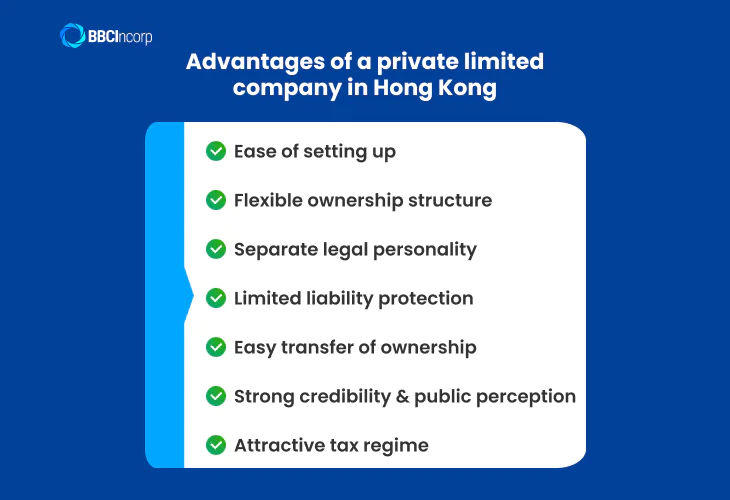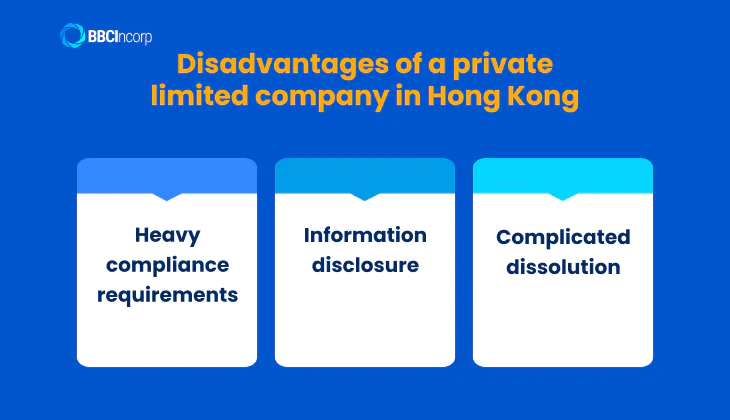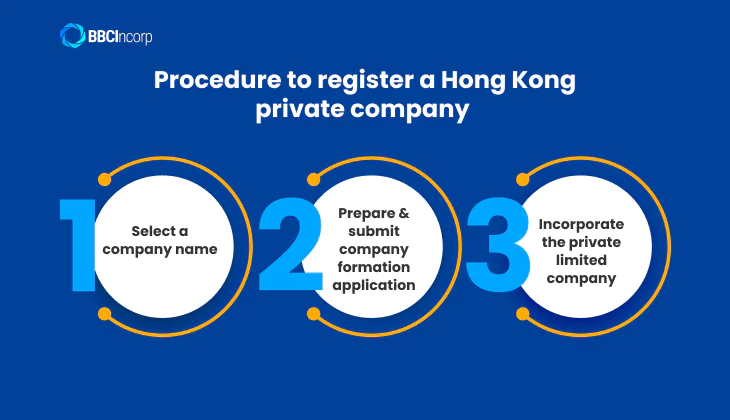
- What is a Hong Kong private limited company?
- Advantages of a private limited company in Hong Kong
- Disadvantages of a Hong Kong private limited company
- Procedure to register a Hong Kong private company
- Requirements for a private limited company to operate in Hong Kong
- Launch your Hong Kong private limited company quickly with BBCIncorp
- To wrap up
Hong Kong is known for its favorable business environment for startups and SMEs. Among various business types in Hong Kong, private limited companies remain the top choice.
Governed by a robust legal framework, these entities are characterized by their flexibility, limited liability structure, and strategic positioning within the global market.
How is the Hong Kong private limited company structured, and what are the benefits? Let’s find out.
What is a Hong Kong private limited company?
A Hong Kong private limited company, often referred to as “Ltd” or “Pvt Ltd”, is among the most popular business models in this jurisdiction. This model offers personal asset protection from business liabilities since it is a separate legal entity from the owner.
As stated in the Hong Kong Companies Ordinance, which came into effect on 3 March 2014, Private Limited Companies (also known as Private Company Limited by Shares Hong Kong) are among 5 different company types that can be formed.
In Hong Kong, it would not be an exaggeration to say that this is the most commonly used business entity for SMEs and trading companies.

Advantages of a private limited company in Hong Kong
Forming a private limited company is one of the most popular ways to do business in Hong Kong, thanks to its flexibility, credibility, and strong legal protections. Below are the key advantages of choosing this structure, along with practical examples to illustrate how it benefits entrepreneurs.

Ease of setting up
A private limited company in Hong Kong is quick and simple to establish, typically taking as little as 24 hours once all required documents are ready. The process can also be delegated entirely to a corporate service provider, making it even more convenient.
For example, a Singapore-based technology startup registered its Hong Kong entity overnight through an agency, which allowed them to sign an office lease and recruit local staff almost immediately. This ease of incorporation makes Hong Kong particularly attractive for businesses looking to expand regionally without delay.
Flexible ownership structure
This business entity requires only one shareholder and one director, who can be the same person, and allows up to 50 shareholders. A local company secretary and a registered office address in Hong Kong are mandatory, but these can also be provided by service providers. Many small and medium-sized enterprises start with a single owner and add investors later as the business grows.
For instance, a family-owned trading business began with one shareholder and later expanded to include strategic investors by issuing additional shares.
Separate legal personality
A private limited company is a distinct legal entity, completely separate from its owners. This means the company can acquire assets, enter into contracts, sue, and be sued in its own name.
As a result, the business’s operations and obligations remain separate from the personal affairs of its shareholders. This legal protection is critical for companies operating in industries with higher risk or regulatory complexity.
Limited liability protection
Perhaps one of the most significant advantages is that the liability of each shareholder is limited to the amount of their shareholding.
For example, a logistics company that suffered a business loss during the pandemic was able to settle its obligations by liquidating its company-owned trucks and selling part of its shares, without exposing the personal savings or property of its shareholders. This provides peace of mind and encourages entrepreneurial risk-taking.
Easy transfer of ownership
A private limited company’s shares can be fully or partially transferred, allowing ownership changes to occur smoothly. This flexibility makes it easier to bring in investors, hand over control to successors, or exit the business entirely.
For instance, an interior design firm, for instance, sold 40% of its shares to a strategic partner without disrupting its day-to-day operations.
Strong credibility and public perception
Private limited companies enjoy stronger credibility compared to sole proprietorships or partnerships. The stable structure and compliance with Hong Kong’s Companies Ordinance enhance the company’s reputation.
Banks, investors, and suppliers often view incorporated businesses more favorably, making it easier to secure loans, attract capital, and negotiate contracts.
Attractive tax regime
Hong Kong’s corporate tax system is among the most competitive in the world. The first HKD 2 million of profits is taxed at just 8.25%, while profits beyond that are taxed at 16.5%.
In addition, if you can demonstrate that certain income was earned outside Hong Kong, that income may be exempt from profits tax altogether. Many multinational businesses use this feature to optimize their regional tax strategy.
Overall, a private limited company in Hong Kong provides a highly advantageous platform for businesses of all sizes. Its ease of setup, legal protections, credibility, and tax benefits make it the preferred choice for both local entrepreneurs and international companies entering the Asian market.
Disadvantages of a Hong Kong private limited company
Even though a private limited company in Hong Kong offers many benefits, it also comes with some challenges that business owners should consider before incorporating.

Heavy compliance requirements
One of the key drawbacks is the ongoing compliance burden. A private limited company is subject to several statutory obligations each year. These include holding annual general meetings, filing an annual return with the Companies Registry, submitting tax returns to the Inland Revenue Department, and maintaining proper accounting records and audit reports.
Failing to meet these deadlines can result in penalties and even legal action. Many business owners find it necessary to engage professional service providers to manage these tasks, which adds to operating costs.
Information disclosure
Another disadvantage is the lack of complete privacy. Certain corporate information must be disclosed and made available to the public through the Companies Registry. This includes details of directors, shareholders, the company secretary, and the registered office address.
For businesses or owners who prioritize confidentiality, this transparency may feel intrusive and could potentially expose sensitive information to competitors or the public.
Complicated dissolution
Closing down a private limited company can also be more complex than expected. If the company has outstanding debts or unresolved obligations, the winding-up process may involve lengthy legal procedures, settlement negotiations, and clearance of liabilities.
In such cases, voluntary dissolution is not possible until all debts are settled, which can delay closure and incur additional administrative costs.
Procedure to register a Hong Kong private company
Registering a private limited company in Hong Kong is a straightforward process, thanks to the city’s business-friendly regulatory framework.
However, understanding each step clearly and complying with every private limited company in Hong Kong requirement is crucial to ensure a smooth incorporation and avoid delays or penalties. Below is a detailed guide on the procedure.

Step 1: Select a name for your company
The first step in setting up a company in Hong Kong is to choose a unique and appropriate name for your business. Your company name must not duplicate an existing name on the Companies Register and must comply with Hong Kong’s naming guidelines, avoiding words that imply government affiliation or violate public order.
You can check the name availability through the Companies Registry’s online portal before proceeding.
A distinctive name not only ensures compliance but also helps establish your brand identity from day one. Take your time to pick a name that reflects your company’s mission and values.
Step 2: Prepare and submit your company formation application
Once your name is confirmed, you can move on to structuring your company and preparing the required documents. At this stage, it’s important to understand all requirements, which include appointing:
- At least one shareholder (individual or corporate, up to a maximum of 50)
- At least one natural person as a director
- A local company secretary
- A registered office address in Hong Kong
After finalizing your company structure, prepare the following documents for submission to the Companies Registry (CR):
- Incorporation application form (NNC1 for new companies)
- A signed copy of the Articles of Association
- Identity and address proof of each individual shareholder and director (passport and proof of address for foreigners; Hong Kong ID for residents)
- Corporate documents of any corporate shareholder
Once these documents are ready, you must first apply for approval of your chosen company name with the CR, then file the full application along with the prescribed fee. Applications are typically processed within 24 hours if all documents are correct and complete.
Have you ever wondered how much it would cost you to start your business in Hong Kong? Try out our Hong Kong cost planning quiz for useful cost estimation of your company.
Step 3: Incorporate your private limited company in Hong Kong
Upon approval, you will receive your Certificate of Incorporation and Business Registration Certificate, officially marking the birth of your company. In addition, staying compliant with ongoing obligations is key to maintaining your good standing and avoiding penalties.
Some notable annual maintenance and compliance requirements include:
- Renewal of registered office and company secretary
Every Hong Kong limited company must maintain a registered office and appoint a local company secretary. These services must be renewed annually and are often included in the service package of your corporate service provider.
- Filing of annual return
An annual return (form NAR1) must be filed with the Companies Registry within 42 days of your incorporation anniversary each year. Late filings can result in substantial fines or prosecution, depending on the severity.
- Bookkeeping and statutory audit
All Hong Kong companies are required to maintain proper accounting records and undergo an annual statutory audit performed by a Hong Kong-certified accountant. Audit fees vary depending on your company’s turnover, business activities, and transaction volume.
Remaining vigilant about these compliance obligations ensures your company can grow sustainably while maintaining its legal status. You can find more detailed guidance on these obligations in the Companies Ordinance (Cap. 622).
Tips
Check out our Guide to Countries’ Annual Compliance for a more compact overview of your Hong Kong private limited company.
Requirements for a private limited company to operate in Hong Kong
Setting up and running a private limited company in Hong Kong requires meeting several key legal and operational conditions:
Registered office
A private limited company in Hong Kong must have a local registered office. This address cannot be a PO box and serves as the official location for receiving government correspondence and keeping statutory records.
Company secretary
It is mandatory to appoint a company secretary. If an individual is appointed, they must ordinarily reside in Hong Kong. If a corporate body is appointed, it must have a registered office in Hong Kong. The secretary is responsible for ensuring that the company meets ongoing compliance obligations.
Directors and shareholders
At least one natural person must be appointed as a director. The role of director is crucial in overseeing the company’s operations and ensuring compliance with statutory obligations.
There is no restriction on the nationality or residency of directors or shareholders. A private limited company can have between one and fifty shareholders, who may be individuals or corporate entities.
Share capital and documents
There is no minimum share capital requirement, though most companies issue at least HKD 1,000. The company must adopt Articles of Association, defining its internal governance, and file all required incorporation documents with the Companies Registry.
Ongoing compliance
The company must maintain a Significant Controllers Register, hold a valid Business Registration Certificate, and file annual returns and audited accounts. Renewing the business registration and meeting tax filing obligations are also essential.
Together, these requirements form the foundation for legally incorporating and operating a private limited company Hong Kong, providing structure, credibility, and regulatory compliance.
Launch your Hong Kong private limited company quickly with BBCIncorp
A private limited company in Hong Kong is a smart choice for entrepreneurs who value efficiency, low taxes, and global credibility. With the right partner, the process becomes seamless and fast.
At BBCIncorp, we are a trusted corporate service provider with years of experience helping businesses establish a strong presence in Hong Kong. Our team understands the regulatory landscape and provides professional guidance at every step, ensuring your private limited company in Hong Kong meets all legal and operational requirements.
By choosing BBCIncorp, you benefit from:
- Fast and efficient incorporation, often completed within one business day
- Expert preparation and filing of all required documents
- Support in drafting Articles of Association and obtaining the Business Registration Certificate
- Comprehensive services, including a company secretary, registered office, and ongoing compliance
- Transparent pricing with no hidden fees
- Dedicated client support to help you navigate the Hong Kong business environment
Learn more about our comprehensive Hong Kong company formation services and take the first step toward business success today.
To wrap up
Hong Kong private limited companies are an excellent investment option for SMEs due to their favorable business environment and minimal entry requirements.
No matter if you’re a new entrepreneur or already conducting business in this jurisdiction, this may be the path to success for you. Further, with our company formation services, your private limited company in Hong Kong is ready to go within only hours.
However, forming a company is not something to decide in a rush. In case you need further consulting, our experts are always available to assist you. Simply drop us your questions at service@bbcincorp.com for support today.
Frequently Asked Questions
Is a private limited company the right structure for your business?
A private limited company in Hong Kong suits entrepreneurs who want limited liability, credibility, and room to grow. As a separate legal entity, it protects your personal assets from business debts while allowing you to raise capital through investors or share transfers. This structure also enhances your reputation with clients and partners.
However, it comes with responsibilities like annual filings, tax compliance, and audits, which may not fit very small or informal ventures. If you aim for growth, risk protection, and long-term stability, a private limited company is an ideal choice to support your ambitions.
What's the difference between a public and private limited company?
In Hong Kong, both public and private limited companies are separate legal entities, but they serve different purposes. A private limited company is designed for small to medium-sized businesses. It can have up to 50 shareholders, does not offer shares to the public, and provides more privacy over company information.
A public limited company, on the other hand, can raise capital by offering shares to the public through a stock exchange. It has no limit on the number of shareholders but faces stricter reporting and disclosure rules.
For most entrepreneurs, a private limited company is more practical and manageable.
Can foreigners establish a private limited company in Hong Kong?
Yes, foreigners can fully own and operate a private limited company in Hong Kong. There are no residency or nationality restrictions on directors or shareholders, making it an attractive choice for international entrepreneurs. At least one director must be a natural person, and the company must appoint a Hong Kong-based secretary and maintain a local registered office.
Foreign owners can complete the incorporation process remotely without visiting Hong Kong. The flexibility, along with strong legal protections and access to global markets, makes Hong Kong a preferred destination for global entrepreneurs.
Read our guide about How to Start up Business in Hong Kong for detailed information.
Why most entrepreneurs choose the private limited company structure?
The Hong Kong LLC (officially a private company limited by shares) remains the most popular vehicle for both local and foreign investors because it provides full limited liability, allows 100% foreign ownership, requires only one director and one shareholder (who can be the same person), and can be incorporated in as little as one day via the Companies Registry’s e-Registry portal.
Unlike a representative office in Hong Kong, which is restricted to non-profit-generating liaison activities and has no separate legal status, a hong kong llc enjoys full contractual capacity, tax residency benefits, and access to Hong Kong’s extensive double-taxation treaty network.
For non-commercial objectives such as charities or trade associations, a Company Limited by Guarantee is available, but the vast majority of businesses opt for the flexibility and asset protection of the hong kong llc structure from the start.
Disclaimer: While BBCIncorp strives to make the information on this website as timely and accurate as possible, the information itself is for reference purposes only. You should not substitute the information provided in this article for competent legal advice. Feel free to contact BBCIncorp’s customer services for advice on your specific cases.
- What is a Hong Kong private limited company?
- Advantages of a private limited company in Hong Kong
- Disadvantages of a Hong Kong private limited company
- Procedure to register a Hong Kong private company
- Requirements for a private limited company to operate in Hong Kong
- Launch your Hong Kong private limited company quickly with BBCIncorp
- To wrap up
Industry News & Insights
Get helpful tips and info from our newsletter!
Stay in the know and be empowered with our strategic how-tos, resources, and guidelines.






